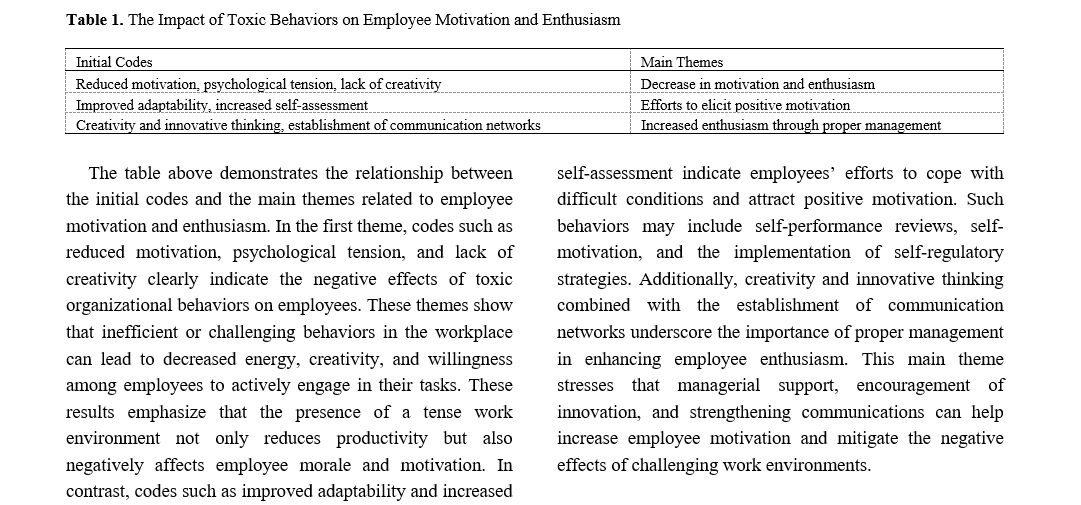Design and Explanation of a Model for Managing Difficult Employees in Human Resource Managers of the Housing Foundation of the Islamic Revolution
Keywords:
Behavioral model, difficult employees, human resource managementAbstract
This study aims to design and explain a comprehensive model for managing difficult employee behaviors in the Housing Foundation of the Islamic Revolution. The significance of this topic lies in the negative impacts of difficult behaviors on productivity, team morale, and organizational culture. Accordingly, by focusing on identifying and analyzing difficult behaviors, the study seeks to provide practical solutions for human resource managers to help reduce organizational tensions and improve the workplace environment. This research employs a mixed-methods approach (qualitative and quantitative). In the qualitative phase, semi-structured interviews with human resource managers were analyzed, and relevant findings were extracted. In the quantitative phase, data were collected using standardized questionnaires and analyzed through factor analysis and hypothesis testing. The results highlighted the importance of implementing managerial strategies to mitigate toxic behaviors and enhance constructive interactions. Solutions such as conducting constructive feedback sessions, improving communication processes, and training stress management were among the most effective measures identified in the study. These initiatives, by strengthening team culture and transparency in communication, facilitate the reduction of tensions and increase employee engagement and commitment. Statistical tests also indicated that variables such as explicit honesty and social awareness have the most significant impact on improving organizational behaviors. Ultimately, this study emphasizes that managing difficult organizational behaviors requires a comprehensive and multidimensional approach. The findings underscore the importance of continuous monitoring and evaluation, organizational training, and the application of effective leadership to create a positive work environment and reduce negative behaviors. By identifying key factors and providing practical strategies, this research contributes to the existing body of knowledge on managing toxic organizational behaviors and offers guidance for managers and organizational policymakers.
References
H. Schüler-Lubienetzki and U. Lubienetzki, Difficult People at Work: Action Strategies for Dealing with Challenging Personalities. Springer Nature, 2023.
T. Ratna, Dealing with Difficult People. 2019.
B. E. Kurtulmuş, Toxic leadership and workplace bullying: The role of followers and possible coping strategies. The Palgrave handbook of workplace well-being, 2020, pp. 1-20.
N. Gravina, A. King, and B. Wine, "Finding a Meaningful Career Using Organizational Behavior Management," Behavior Analysis in Practice, vol. 17, no. 1, pp. 338-346, 2024, doi: 10.1007/s40617-023-00871-4.
C. N. Lacerenza, S. K. Johnson, B. Lambert, and H. P. Van Wagoner, "The benefits of inclusive organizational behavior: Why diversity climate improves mental health and retention among women during a crisis," Journal of Organizational Behavior, 2024, doi: 10.1002/job.2768.
S. M. Jex, T. W. Britt, and C. A. Thompson, Organizational Psychology and Organizational Behavior: Evidence-based Lessons for Creating Sustainable Organizations. John Wiley & Sons, 2024.
Z. Banishiekh Islami, D. Kayakjori, M. J. Taghipourian, and M. Rahmati, "Presenting a Model of Toxic Employee Behavior in Government Organizations," 2023.
H. Zinati Shoa, "The Impact of Positive Organizational Behavior and its Dimensions on Competitive Advantage," 2023.
F. Bostani and M. R. Khazripour, "Organizational Behavior Management, Investigating Operational Risk Management and Employee Behavior in Organizations," 2023.
A. Akbari, S. Rahbari, and M. Kodkhodaei, "Investigating the Role of Organizational Justice on Innovative Work Behavior of Employees with the Mediating Role of Organizational Learning (Case Study)," 2023.
H. Ibrahim, M. Abdulai, S. Iddrisu, and I. Konlan, "Society and organizational leadership: Investigating the sociocultural construction of toxic and constructive leaders in Ghana," International Journal of Cross Cultural Management, vol. 14705958241237698, 2024, doi: 10.1177/14705958241237698.
A. Sabino, F. Cesário, and A. Antunes, "Linking toxic leadership to exit, voice, silence and neglect: the mediating role of loyaltyA ligação entre a liderança tóxica ea saída, a voz, o silêncio ea negligência: O papel mediador da lealdadeEl vínculo entre liderazgo tóxico y salida, voz, silencio y abandono: el papel mediador de la lealtad," Management Research: Journal of the Iberoamerican Academy of Management, 2024, doi: 10.1108/MRJIAM-10-2023-1471.
X. Huili and Z. Yumei, "Validity and reliability of the toxic leadership behaviors of nurse managers scale among Chinese nurses," Frontiers in Psychology, vol. 15, p. 1363792, 2024, doi: 10.3389/fpsyg.2024.1363792.
A. Arghavani, "Investigating the Impact of Perceived Support and Frustration in the Workplace on Organizational Citizenship Behavior with the Mediating Role of Work-Life Conflict," 2023.
R. Bahramnejad, "Investigating the Relationship between Organizational Citizenship Behavior and Organizational Performance in the Jihad Agriculture Organization of Kerman Province," 2023.
A. Changizi, "Qualitative Meta-Analysis of Scientific Research on Factors Affecting Organizational Citizenship Behavior," 2023.












